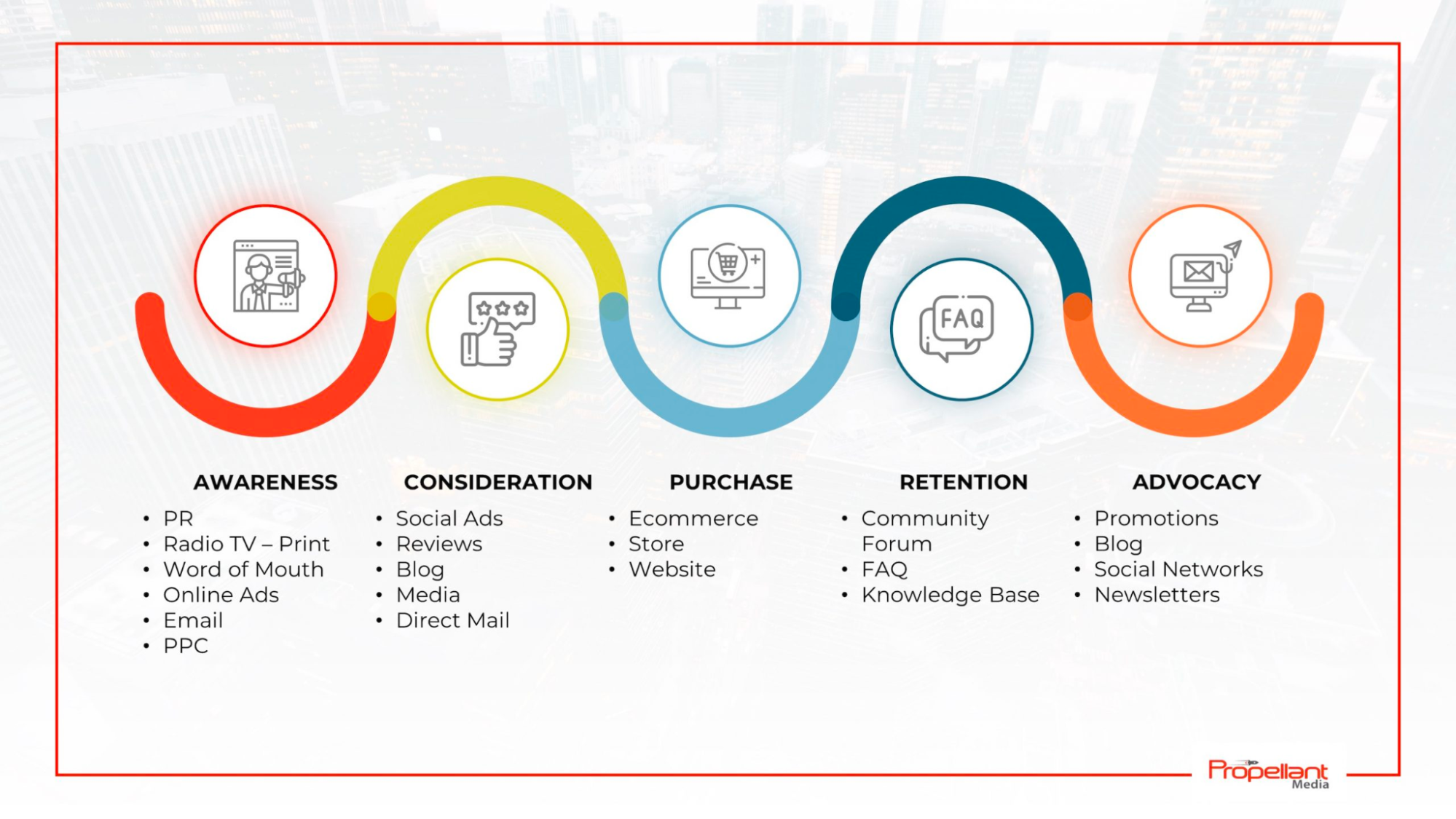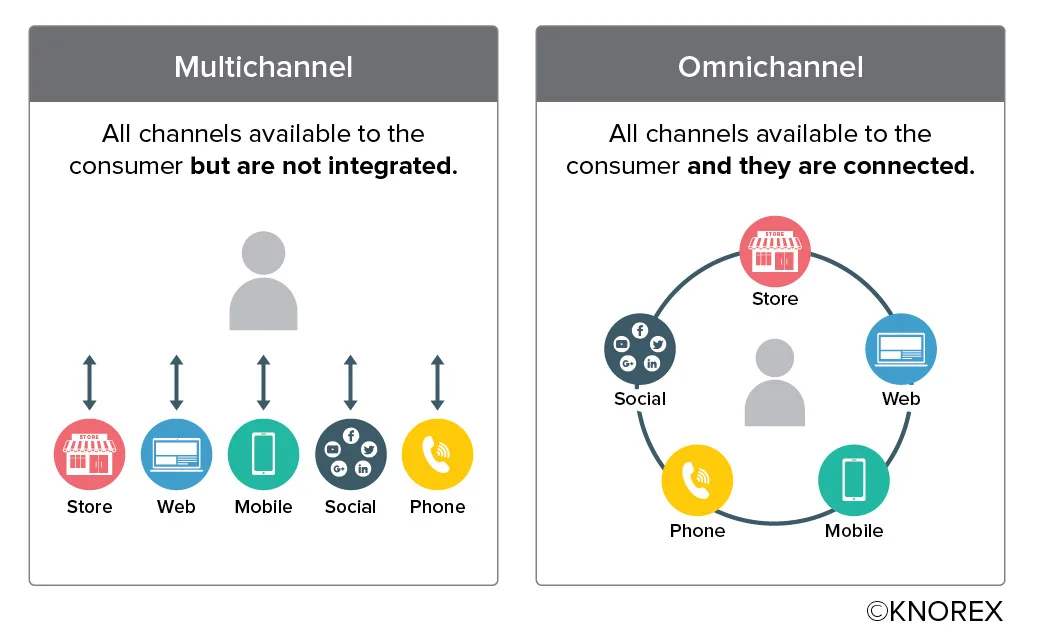If you are like many marketers today, chances are that you have heard or seen the term ‘omnichannel marketing’ used quite a lot. This type of marketing allows businesses to give customers a personalized experience throughout the customer journey.
But how do you provide this seamless experience to your customers?
Perhaps you have some idea of what it refers to but aren’t quite sure if you are right. Keep reading to learn more about omnichannel marketing, why it is unique, how it is differentiated from multichannel marketing, and how to formulate an omnichannel marketing strategy for your business.
What does omnichannel mean?
The word omnichannel is derived from the Latin Omnis, meaning all/every. Channel, in this context, refers to the different ways that a target audience today can interact with a brand. An omnichannel approach to the customer journey means providing a consistent experience throughout different channels, resulting in higher customer retention and more revenue.
For example, mobile devices, computers, websites, email, SMS messages, search engines, social media platforms (like Facebook, Twitter, Instagram, LinkedIn, and TikTok), WhatsApp Business, and chatbots are all examples of digital channels through which we can interact with brands today. Many channels are often offline channels, such as shopping in-store or contacting a brand via telephone.
What is omnichannel marketing?
Omnichannel marketing refers to marketing campaigns that use all platforms, channels and devices to promote your products and services to prospective and existing customers. No matter the channel or the interaction, the message, visuals, and overall experience of the omnichannel marketing campaign should remain consistent and relevant to the individual prospect or customer.

An omnichannel marketing approach needs to create a message that is entirely seamless across different channels. With this approach, each channel works together to create a unified message and voice for your brand across omnichannel experiences. For example, this marketing strategy would ensure that people who have recently purchased a product don’t get email or SMS messages advertising it to them.
Omnichannel is built on the idea that the underlying data is updated automatically. As a result, this triggers the messaging across all the channels to be adjusted. It allows the shopping experience for potential customers to be more integrated from the first to the last touchpoint.
Omnichannel marketing is designed to pull an organisation’s marketing efforts together, putting them into a consistent and integrated brand experience delivered across all channels. This means the messaging, tone, graphics visuals, and any previous interactions that a customer has had with the brand will all work in harmony. One popular example of omnichannel marketing today is the option to buy something online and then pick it up in-store at a later date.
When done well, an omnichannel marketing strategy should work behind the scenes and be almost unnoticed by customers. It should provide an experience that is so seamless that all customer needs are met as and when they arise. Customers are more likely to notice omnichannel marketing strategies that are not executed well, as these are likely to cause frustration.
Omnichannel vs multichannel strategies
Omnichannel and multichannel marketing may be quite similar. However, these terms cannot be used interchangeably as they have key differences that you need to keep in mind.
With multichannel marketing, the brand is at the centre of the marketing strategy, and channels operate independently. The communication is primarily static, with messages that remain relatively the same across the different channels. Channels do not update and personalise to suit the needs of the customer.

On the other hand, with omnichannel marketing, the customer, rather than the brand, is at the centre of the marketing strategy. The message adapts and changes based on how the customer has interacted with the brand, with customer behaviour prompting these updates. The channels work together rather than independently.
What are the benefits of omnichannel marketing?
Experts suggest that one of the most significant benefits of omnichannel marketing is that it makes the marketing relevant for the brand and the customer. Some of the main advantages of an omnichannel marketing strategy include the following:
- Higher Spend Rate: Research has shown that customers who engage with omnichannel marketing campaigns spend around thirteen per cent more on average compared to customers engaging with single-channel marketing campaigns, which impacts business or ecommerce valuation.
- Higher Order Rate: Statistics from 2021 show that omnichannel campaigns earn almost a 500% higher order rate compared to those that depend on just one marketing channel. The conversion rate improves by over four hundred per cent for those using SMS marketing as one of the channels.
- Higher Engagement: Omnichannel campaigns were reported to have earned an engagement rate of almost 19%, compared to the much lower, just over 5% engagement rate for those using a single-channel campaign. Since engagement rates are often one of the most important social media KPIs, you might want to take a closer look at this one.
- Higher Customer Loyalty: Marketers who use omnichannel marketing report experiencing a 90% higher customer loyalty and retention rate than single-channel campaigns.
Some further benefits of omnichannel marketing include the following.
Boost brand identity
While improving the customer experience should be the first goal of an omnichannel strategy, it can also positively impact brand awareness. When a brand has a consistent identity across all channels, from email marketing to physical stores, this will make it more recognisable.
It’s customer centric
Omnichannel marketing is all about being customer-centric. These days, brands need to accept that customers know what they want, and retaining loyalty is all about creating an experience that is mainly focused on the needs of the customer rather than the needs of the brand.
Improve ROI
The good news is that the customer experience and the bottom line go hand in hand. When a business adopts an excellent omnichannel strategy, this can increase the lifetime value of each customer. This unified experience improves loyalty and engagement and leads to better customer satisfaction, as well as more purchases and revenue in the long run.
Steps for building an omni channel campaign
When building a successful omnichannel marketing strategy and campaign for your business, it’s essential to lay a solid foundation before you get started.
Omnichannel marketing is a strategy suitable for businesses of all sizes and becoming increasingly more available and accessible.
Even smaller companies and marketers are beginning to see the benefits of launching an omnichannel rather than a single-channel marketing strategy, to the point where almost 70% of decision-makers in eCommerce said omnichannel marketing was important or very important for their business last year.
1 – Get everybody involved in the multichannel approach to marketing
Everybody needs to buy into it when it comes to success with an omnichannel marketing strategy. The whole team needs to agree to ensure that the customer is the brand’s focal point and that they will work together with the platforms to make this happen. For an omnichannel marketing strategy to be successful, this needs to extend beyond the marketing team.
2 – Analyze customer data
When driving customer operations in an omnichannel approach, your customer data should be at the heart and centre. For omnichannel marketing to be successful, each team member should focus on using data to ensure that the best experience is created for the customer. Utilizing advanced customer data platforms can enhance this process by integrating data from various sources, allowing for more sophisticated analysis and more effective engagement strategies.”
Data is required for marketers to ensure that they are sending the most relevant message to the customers at the right time, along with maintaining consistent conversations with customer success and customer service representatives.
The more your employees know about your customers, the better they will be able to interact with and respond to them effectively. From brick-and-mortar stores to your website, each customer interaction can and should be analyzed.
3 – Optimize for mobile
Nowadays, everybody is using a smartphone, which is why mobile optimisation has become essential for any marketer. Mobile eCommerce sales grew massively by over 20% between 2018 and 2021 and have only continued increasing. With this in mind, it has never been more important than ensuring that your omnichannel marketing campaigns are fully optimised for mobile.
4 – Target your messages appropriately
Successful omnichannel digital marketing should revolve around personalisation. Now that you’ve gathered and analysed the data on your customers, the best way to ensure that your message is targeted appropriately and effectively is to segment subscribers into smaller lists.
It becomes easier to send personalized messages when contacts are assigned to different categories based on similar traits. For example, you might want to segment lists based on shopping behaviour, profile and demographic data, or campaign engagement levels.
5 – Test and measure
Any omnichannel marketing strategy will improve over time as you continue collecting and analysing customer data. Today you can get access to a range of robust and effective marketing platforms that will give you much insight into your performance.
From basic overall sales dashboards to more advanced SaaS reporting tools that show aspects such as the performance of segmented lists and allow you to track the campaigns that are making the highest amount of money.
Because of this, it’s important to be active when testing different components such as various messages, subject lines and headers, imagery, send times and more. By regularly testing, you can find out more about which segments respond best to certain messages, allowing you to find the ideal formula that works. This process not only enhances your understanding of your audience but also contributes valuable insights for your marketing report.
In an ever-connected world, marketing channels that work together for consistency and to put the customer’s needs first have become more effective than ever.
Wrapping up
If you want to provide an amazing experience for customers, maintain consistent messaging and increase revenue at the same time, omnichannel marketing is the way forward. Don’t be concerned because of the vast number of online channels. Today’s tools allow anyone to create a consistent customer experience through all the channels they manage.
Speaking of which, email marketing is a great channel to get started with. With Bouncer, we can help you maximize the effect and ROI of each email you send out. We’ll clean up your lists and remove outdated, misspelt, fake and other invalid email messages.
Grab your account today and validate your first 100 emails for free!
Frequently asked questions
What channels does omnichannel marketing cover?
It depends on the channels that your customer base uses. However, the typical channels include social, email, website, mobile, in-store experience, direct mail, phone calls and others. The individual channels you use will depend on your target audience.
What is an example of omnichannel marketing?
Here’s how a typical multichannel marketing strategy works. A customer hears about you on social media or a forum such as Reddit. They then visit your website and see the same messaging and offers. You then retarget them with ads on their Facebook or Instagram accounts. They subscribe to get your emails and you send them out a highly targeted offer based on their interactions so far. In the future, you have their purchase history so you can send them even more targeted offers.
Is omnichannel marketing effective?
When done right and when you use the right marketing automation tools, it is. Research shows that 77% of customers are more likely to purchase again and increase their spending with businesses they feel connected to.

